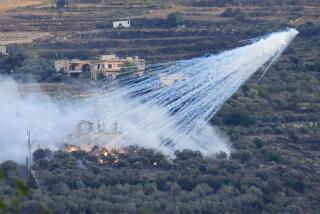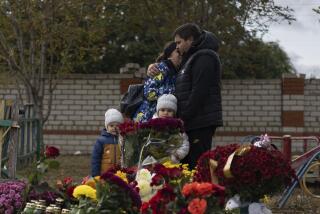Russia’s U.N. envoy says Syria rebels used chemical weapons
- Share via
UNITED NATIONS — Russia’s U.N. ambassador said Tuesday that Russian experts determined that Syrian rebels made sarin nerve gas and used it in a deadly attack outside Aleppo in March.
Ambassador Vitaly Churkin blamed opposition fighters for the March 19 attack in the government-controlled suburb of Khan al Asal, which he said killed 26 people, including 16 military personnel, and injured 86.
The rebels have blamed the government for the attack. The United States, Britain and France have said they have seen no evidence to indicate that the opposition has acquired or used chemical weapons — only the Syrian government.
Churkin told reporters after delivering an 80-page report to Secretary-General Ban Ki-moon that the Syrian government asked Russia, its closest ally, to investigate the attack after a U.N. team of chemical weapons experts was unable to enter the country in a dispute over the inquiry’s scope.
The samples taken from the impact site of the gas-laden projectile were analyzed at a Russian laboratory certified by the Organization for the Prohibition of Chemical Weapons, Churkin said.
He said the analysis showed that the unguided Basha’ir-3 rocket that hit Khan al Asal was not a military-standard chemical weapon.
Churkin said the results indicate it “was not industrially manufactured and was filled with sarin.” He said that the samples indicated the sarin and the projectile were produced in makeshift “cottage industry” conditions, and that the projectile “is not a standard one for chemical use.”
The absence of chemical stabilizers, which are needed for long-term storage and later use, indicated its “possibly recent production,” Churkin said.
“Therefore, there is every reason to believe that it was the armed opposition fighters who used the chemical weapons in Khan al Asal,” Churkin said.
“According to information at our disposal,” he added, “the production of Basha’ir-3 unguided projectiles was started in February 2013 by the so-called Basha’ir al-Nasr brigade affiliated with the Free Syrian Army.”
On Monday, Syria invited Ake Sellstrom, head of the U.N. fact-finding mission on allegations of chemical weapons use in Syria, and U.N. disarmament chief Angela Kane to visit Damascus, the Syrian capital, for foreign minister level talks on conducting a probe of the Khan al Asal attack.
The Russian ambassador strongly backed the idea, calling it “a promising process” that hopefully will lead to an investigation.
Britain, France and the United States have provided the secretary-general with information on other alleged chemical weapons attacks in Syria. Ban has repeatedly said he wants a broader investigation than just Khan al Asal.
“We support a thorough investigation of all credible allegations,” Churkin said, but added that Russian experts “were not impressed at all” by the material provided to them by Britain, the U.S. and France.
President Obama’s administration says it has “high confidence” that Syrian President Bashar Assad’s forces have killed as many as 150 people with sarin gas.
In a letter to the secretary-general June 14, Susan Rice, then-U.S. ambassador to the U.N., said the U.S. had determined that sarin was used in the March 19 attack on Khan al Asal and in an April 13 attack on the Aleppo neighborhood of Sheik Maqsood. She said unspecified chemicals, possibly including chemical warfare agents, were used May 14 in an attack on Qasr Abu Samrah and in a May 23 attack on Adra.
The use of a chemical weapon crossed Obama’s “red line” for escalating U.S. involvement in the conflict and prompted the decision to send arms and ammunition to the opposition, not just humanitarian aid and nonlethal material like armored vests and night goggles.
Churkin said Russia plans to provide the 80-page report to the U.S., Britain and France, and “I hope they find it persuasive.” But he said it will not be made public.
ALSO:
Syrian opposition group names new president
Massive explosion in Beirut rocks Hezbollah stronghold
Egypt names new prime minister after coup: Who is Hazem Beblawi?
More to Read
Sign up for Essential California
The most important California stories and recommendations in your inbox every morning.
You may occasionally receive promotional content from the Los Angeles Times.










